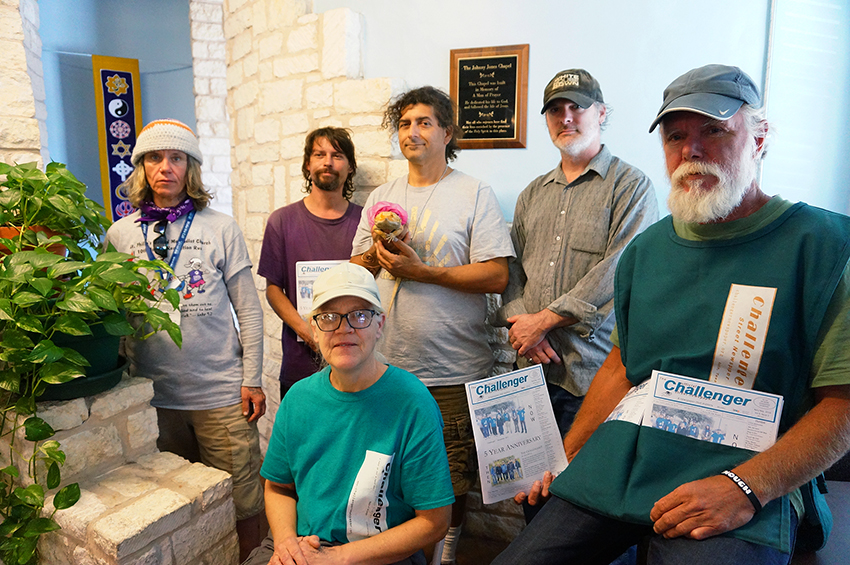Pirate Joe’s latest poem came on like a dream. After five days of rewrites, it was published in the March issue of The Challenger, Austin’s street newspaper written entirely by homeless authors.
“Writing found me; I didn’t find it,” Pirate Joe said. “I let the madman write down all his thoughts, and I pick out what becomes relevant.”
Pirate Joe began writing for The Challenger in its early years around 2011, turning the thoughts that filled his stacks of notebooks into published works. What appeals to him about the paper is its liberal editing policy — anything goes. Unless it’s offensive or inappropriate, writers are free to publish what they want.
“This newspaper is a gem,” Pirate Joe said. “You can just go straight from ‘I have a passion’ to being published.”
Valerie Romness, the paper’s founder and editor, has advocated for the homeless since the ’90s. When she started The Challenger after Austin’s previous street newspaper, The Austin Advocate, went under, she said she vowed to create a publication that “would let their words be their words,” fragments and all.
“They give up out here because nobody is listening,” Romness said. “Nobody hears them. I can’t sit and talk to each one all the time, but I can put their voice out there for everybody else.”
Every month, a new issue of The Challenger is assembled from the basement of St. David’s Episcopal Church, where the group meets on Wednesday afternoons. Romness prints the 20-page paper in Century Gothic font because it requires the least ink, something in short supply for the low-budget operation.
Distributors purchase copies for 50 cents each, then sell the paper on the street for a $2 donation and keep the profits. Writers with published work get 10 free copies.
“[The Challenger] gives them a job [where] they can make their own hours, and it’s OK if they have the same shirt on as yesterday,” Romness said. “At a regular job, if they find out you’re homeless, they get scared. So you have to hide
your backpack.”
According to the City of Austin, 2,300 Austinites spend the night on the streets, in shelters or in their cars on any given night. Although The Challenger cannot directly combat these numbers, Romness said the paper acts as a vehicle to help people on the street find their voice.
“Maybe their boots are a little rotten, so we’ll help them mend those bootstraps so they can pull themselves up and stand up and walk back into society,” Romness said.
With its touching obituaries, poems about love and loss and personal testimonies about life on the street, Romness said The Challenger shows the larger Austin community what is happening within the city’s “most under-represented” population.
“It gives [the people of Austin] a more clear view of what people in poverty are really facing,” Romness said. “It gives a peek into a homeless camp; it lets you [see] what the issues are around homelessness.”
But for Pirate Joe, he just writes about “what appeals to the song in his heart.”
“I’ve been through some of the most hardcore, impossible situations, and I’ve had to pull myself up by my bootstraps while being intimidated the whole time,” Pirate Joe said. “Now I try to fight the good fight when it makes a difference.”















